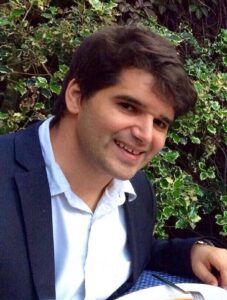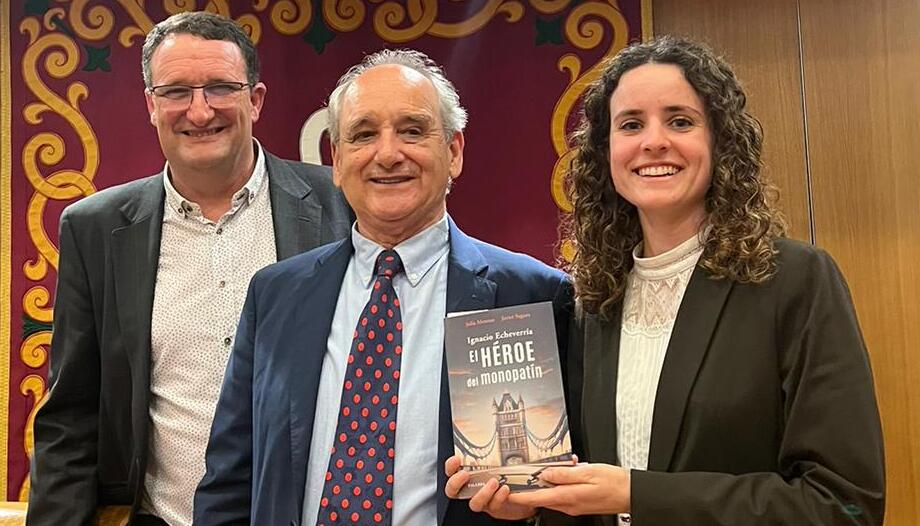Seven years after his death, the legacy of Ignacio Echeverría, the man who confronted terrorists in a London attack armed only with his skateboard, continues to live on. The musical Skate herowhich narrates the last hours of Ignatius' life.

The skateboard hero
The publishing house Palabra has added to these awards with the biography The skateboard herowith a prologue by the protagonist's parents. In Omnes we have had the opportunity to interview the authors, the editor Julia Moreno and Javier Segura, director of the musical.
How did the idea of making a biography about Ignacio Echeverría come up?
Julia Moreno: The idea of writing this book was born when Javier was making the musical "Skate Hero", which tells the last 24 hours of Ignacio's life. Until then, of course, what people knew about him was his death, but Javier thought it was time to tell his life story. I just told him that I had just started a master's degree in book publishing and he proposed me to enter Ignacio's world and reconstruct his life on the pages.
What was the research process involved in writing this book?
Julia Moreno: All through interviews in person, in writing and by telephone. The letters written by people close to Ignatius after his death have also been an important source. With all this information we have tried to seek maximum objectivity at all times, always with the challenge of treating the subject with care, since we cannot forget that this is a book about a real person, who really existed and who died a tragic death. That is something that had to be treated with care when contacting the people who were part of his life.
After talking to people who knew him, what do you think about Ignacio's character?
Julia Moreno: Everyone agreed that he was a person who fought for what he believed was right without any fear. He loved to be with his friends and family. He loved to be a child, when he was with them he was one of them and they loved him very much. I believe that in the words of his lifelong friend we can discover what he was like: "Ignacio was not suicidal. A lover of life, of nature, of his family, of his friends, of his work, Ignacio did not know he was going to die that night. Herein lies his greatness, in not knowing, because he could never know. In normal people, what we see, we process, before acting, through a filter, as a kind of survival instinct, where the most basic fears and apprehensions are mixed, but Ignacio processed it through a different filter, that of whether it is fair or not. That's how it always was and that's how it will remain for eternity".

What do we know about his Christian life?
Julia Moreno: For Ignacio, God was always important. From an early age, his parents took him to Mass and, as he grew older, he himself decided to continue to do so, and even took the initiative to take his nephews to catechism classes so that they could make their First Communion in view of the fact that, if he did not do it himself, they could be in danger of receiving the sacrament. This firmness in the faith sometimes cost him displeasure with his father when he disagreed with certain aspects of the Church that Ignatius defended, because above all he knew how to differentiate between the Church and the sins committed by the people who make up the Church. Moreover, he was not afraid to go to confession even in places where he knew it would not be well received, such as in skateboarding environments or on trips with his friends where he made it a priority to go to Mass on Sundays, even if he had to walk a long way to find a church.
Javier Segura: Undoubtedly his faith shaped his whole life. Moral rectitude or the desire to be radically good was born of his life of faith. There are a thousand simple details that speak to us of this. His experience and appreciation of the sacraments, his charity towards strangers, his daily Gospel prayer, his spiritual direction, his Catholic Action meetings in the parish, the catechesis he gave in England... We could define it as the committed Christian life of a young layman today.
The people who had been attacked before Ignacio's intervention and survived, have they ever talked about him or do they remember what happened?
Javier Segura: There were several different reactions. There is a couple who were being attacked, the Dowlings, who survived the attack, who after the trial contacted Isabel, Ignacio's sister. They wanted to thank them now that they knew who had saved them, and they told them that they would remember Ignacio every day of their lives. They did not want to give interviews, but they continued to communicate with Ignacio's family and sent them photos of their wedding and other moments from Australia, where they lived. And also several of the policemen who intervened in the attack were in contact with the family, took pictures or wrote articles in magazines on the subject.
The family has been visited twice by the British police, who have great admiration for Ignacio. And I would add, for his family, because he showed a gesture that honors him by not entering into the current of defamation that arose suggesting that the British police were the ones who had killed Ignacio by mistake.
How was the creation of the musical "Skate Hero" and what fruits has it yielded?
Javier Segura: The musical arose from the Catholic group Milicia de Santa Maria founded by the Venerable Tomas Morales S.I. It is an apostolic group of young people who want to bring the faith to their peers. For some years they have been working this format of the musical as a useful tool to transmit the values of the Gospel. This is the fourth musical of these characteristics. The first was on the occasion of the Year of St. Paul, "Children of Freedom," and the second was for the Year of Mercy, "Contigo. The life and example of Ignacio Echeverría deserved to be told and sung as a model of Christian life for today's youth.
How does Ignatius' courage continue to inspire people today?
Javier Segura: Perhaps the first people it has inspired are the young people who have made the musical. Having to take it to the stage makes you end up living its values. I remember with special emotion the time we performed it in Las Rozas, where Ignacio was from, when we were able to have on stage the same skateboard he used in the attack. It was really moving. Another significant moment was when we were called by the Got Talent program to open the season with the song-prayer 'Dar la vida por amor' (Give your life for love). Seeing Risto Mejide moved by Ignacio's example made us see that his message of unconditional love is universal.







